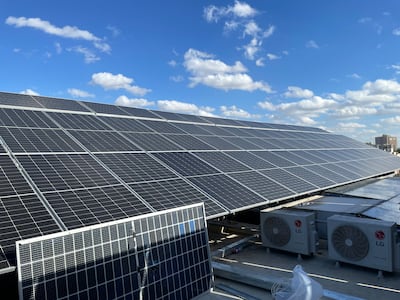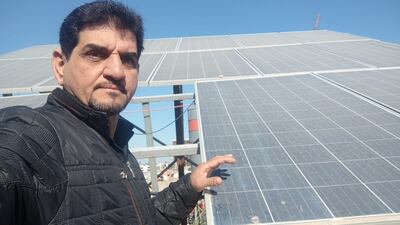Baghdad resident Mazin Sharhan Al Sudani is one of many to have benefitted from Iraq’s solar energy revolution.
Mr Al Sudani’s decision to install a solar system in his home not only reduced his household expenses but also provided peace of mind in a country plagued by chronic power shortages.
“I was tired of the constant struggle with power cut and the financial burden of paying for electricity from the private neighbourhood generator,” Mr Al Sudani, 52, told The National.
“Installing solar panels in my home was not only a game-changer but also brings me peace of mind as now we have stable, cheap and clean electricity,” he said.
In a bid to overcome the long-standing challenge of electricity shortages, Iraq is embarking on a transformative journey towards solar energy.
As the demand for solar solutions continues to rise, homeowners and businesses are recognising the long-term cost savings and environmental benefits associated with solar power.
With abundant all-year sunlight in Iraq, harnessing solar energy has the potential not only to alleviate power shortages but also contribute to the country’s broader goals of reducing its carbon footprint.
Four years ago, Mr Al Sudani paid 13 million Iraqi dinars ($8,000) for a solar system which generates five kilowatts. But it is a move that he says was “worth it”.
Before the installation, he used to pay 250,000 ID ($160) per month for the private generator in his neighbourhood and about 45,000 Iraqi dinars ($29) for the electricity from the national grid.
Now that the investment has been paid off, the move has saved him about $200 per month. It also counters any price increases, with the savings set to only increase with time.
“Now, I’m not buying electricity from the private generator and the cost of what we consume from the national grid has been reduced by nearly 90 per cent,” he said.
Wasted electricity opportunities
Despite its vast oil wealth which makes it Opec’s second-biggest producer, Iraq struggles to provide enough electricity following decades of war and sanctions. The country also faces rampant corruption and crumbling infrastructure. It depends on Iran for approximately one third of its electricity needs.
Since the 2003 US-led invasion that toppled Saddam Hussein’s regime, it has spent at least $60 billion on the electricity sector, former prime minister Mustafa Al Kadhimi said in late 2020.

For most of the post-2003 period, most of the ministry's budget has been spent on staff salaries rather than new infrastructure. Critics say this is a result of political parties demanding jobs for their supporters in the ministry.
During summer heatwaves when temperatures exceed 50°C in some parts of Iraq, power generation stood at 24,000 megawatts, an increase of 22 per cent from the same period last year.
That was still not enough to supply electricity for 24 hours when demand from its 43 million people requires 34,000 MW.
The country has set a goal to cover one third of its electricity needs through renewable energy investments by 2030 and to encourage investment in gas projects, Prime Minister Mohammed Shia Al Sudani has said.
Last year, to encourage renewable energy, Iraq's Central Bank announced the allocation of $750 million in almost zero-interest loans for people and private companies adopting solar power.
Iraq has so far signed three separate deals with international companies to produce 2,250 MW by 2026, the Electricity Ministry spokesman Ahmed Mousa told The National.
The companies – France’s TotalEnegries, Power China and Al Bilal Group – are expected to add a total of 300 MW next summer, Mr Mousa added.
Discussions are under way with Saudi Arabia's ACWA Power and the UAE's Masdar to set up solar power plants in different parts of Iraq to produce 1,000 MW each, he added.
Iraq plans to add 7,000 MW from renewable energy by 2030, he said.
The private sector, too, is playing a pivotal role in the solar energy revolution.
What was once a nascent and often mocked industry in Iraq is now witnessing a significant surge in demand, said Ahmed Jassim, the executive director of solar energy company Bereket Al Noor.
“When we first introduced the solar energy systems for houses in 2018 we faced many challenges and hardships,” Mr Jassim told The National.
“People were not convinced that these photovoltaic panels can secure enough electricity for their homes and they even mocked us,” he added.
From 2018 to 2020 the company worked on raising awareness of the benefits of home solar systems, through organising workshops in co-operation with NGOs, training courses for engineers and social media campaigns.
“We have exerted great efforts to change the culture of solar energy in the country until we saw a spike in demand from 2021,” he said.
The company offers solar systems for homes, starting from 5KW to 20 KW as well as bigger ones for agricultural and industrial projects. Prices for home systems range from $7,000 to $10,000 per installed system.


